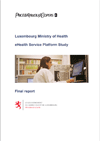
The national eHealth plan already pointed out that interoperability is a major challenge, as well as organisational challenges. However, the national eHealth plan was still too high-level, without a clearly defined and realistic implementation scenario. In particular, a specific interoperability roadmap was missing. Hence, this roadmap and the related interoperability platform have become a priority.
As the Ministry of Health of Luxembourg wishes to define the optimal way to move forward in the national eHealth programme, PwC has been requested to conduct a study on the costs and benefits of an interoperability platform for Luxembourg. This study comprises a comparative analysis of eHealth services in other countries and transposes the results - where applicable - to the Luxembourg healthcare context.
Download: Luxembourg Ministry of Health eHealth Service Platform Study (.pdf, 4.810 KB).
Download from eHealthNews.eu Portal's mirror: Luxembourg Ministry of Health eHealth Service Platform Study (.pdf, 4.810 KB).